Sign up now to join the JEGS email newsletter and be the first to learn about new products, special deals and e-mail only offers!

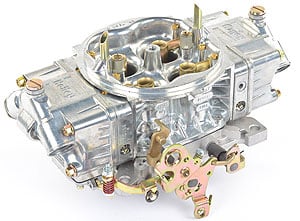
With their unique design, double pump carburetors are a great choice for performance-oriented vehicles relying on quick revving and rapid throttle response, like track cars and hot rods, especially those equipped with a manual transmission.
However, for daily drivers, which typically don't depend on rapid acceleration and high power output, a double pumper might not be the most practical option.
In this article, we’ll cover double pump carbs in more detail to help you determine if they’re a good choice for your setup.
We'll start by taking a closer look at double pump carbs and how they work. Then, we'll compare them to vacuum secondary carbs so you understand the differences. Finally, we'll explain how you can tell if your double pump carburetor has gone bad.
Let's get started.
A double pump carburetor is a mechanical secondary pump that gets its name from its two accelerator pumps. This design, featuring four barrels and a mechanical linkage between the primary and secondary sides, allows for a more responsive and powerful engine performance.
The accelerator pumps prevent lean conditions during rapid throttle movements, injecting fuel fast and efficiently when the throttle is opened quickly. This is especially helpful in high-performance and racing vehicles, where rapid engine response and immediate fuel delivery are important.
Double pump carburetors suit manual transmissions well, as their dual accelerator pumps offer quick fuel delivery for rapid gear changes, ensuring responsive engine performance during acceleration and high-speed driving.
The first double pumper was the Holley 4150 carburetor, introduced in the 1957-58 Ford Thunderbird. It set a new standard in performance, combining reliability with enhanced fuel delivery, which made it a game-changer in the world of automotive racing and street performance.
Today, the double pump carburetor continues to be a favored choice among enthusiasts and racers.
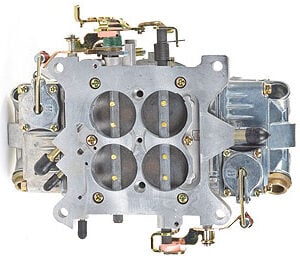
Vacuum secondary carburetors are dependent on engine vacuum and are found in most street vehicles equipped with a “mild” camshaft. At idle or cruise, the vacuum from the engine allows the diaphragm to keep the secondaries closed and once the accelerator pedal is pressed suddenly or all the way down, engine vacuum drops, causing the diaphragm to allow the secondaries to open for increased airflow and performance.
This setup results in smoother driving and better fuel efficiency, making vacuum secondary carburetors a preferred choice for regular street use.
These carburetors open up gradually, ensuring a steady mix of air and fuel to your engine, avoiding sudden jumps in power that can occur with mechanical secondaries.
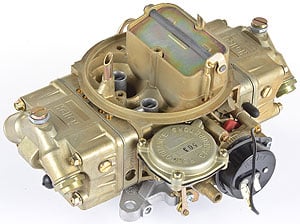
As for mechanical secondary carburetors, such as the Holley 750 double pumper, these have direct linkages that open the secondary barrels at the same time with the primaries. This is perfect for race cars and high-performance vehicles that need quick response and a lot of power right away.
This direct link means the carburetor provides a consistent and strong power boost, regardless of how fast the engine is running or the demands placed on it.
Choosing between the two types of carburetors comes down to what your vehicle needs and your driving preferences. If you want a smooth, efficient ride for everyday use, vacuum secondaries are a good choice. But if you're all about speed and power, like in racing, then mechanical secondaries are the way to go.
Learn more about identifying carburetor types in our detailed guide.

Sign up now to join the JEGS email newsletter and be the first to learn about new products, special deals and e-mail only offers!

Since the point of having a double pumper is to squeeze every last drop of performance out of a vehicle, it’s important that this part is running optimally. Below are a few symptoms to watch for that suggest your double pump carb has gone bad:
Learn more about different carburetor problems and solutions in our detailed guide.
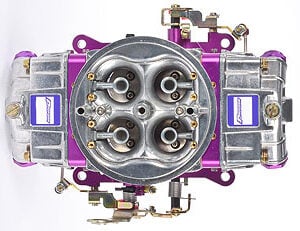
If you’ve made it this far, you should now have all the necessary knowledge to determine if a double pump carburetor is right for you.
Regardless of your choice, consider JEGS for all your automotive needs. Browse our massive selection of auto parts, including vacuum secondaries and double pumpers, and order online today. Still have questions? Contact our team today.
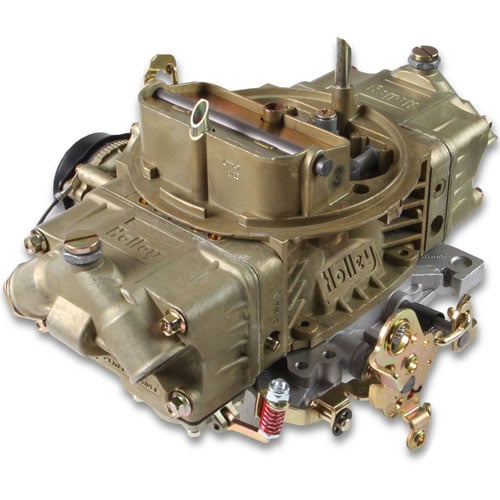




Leave a Reply